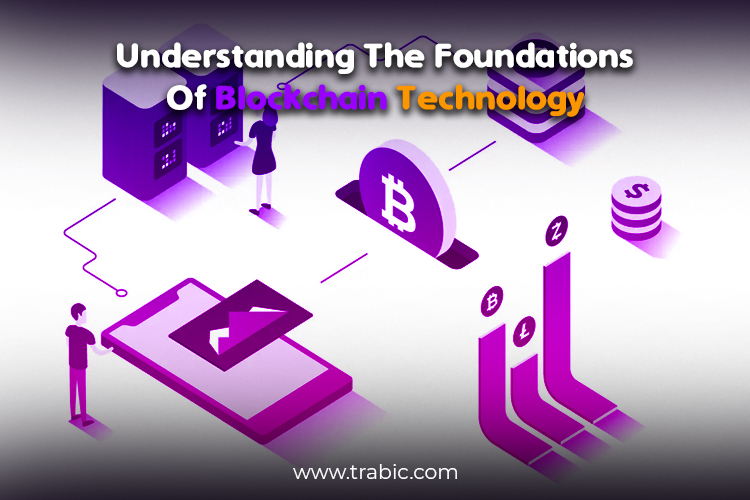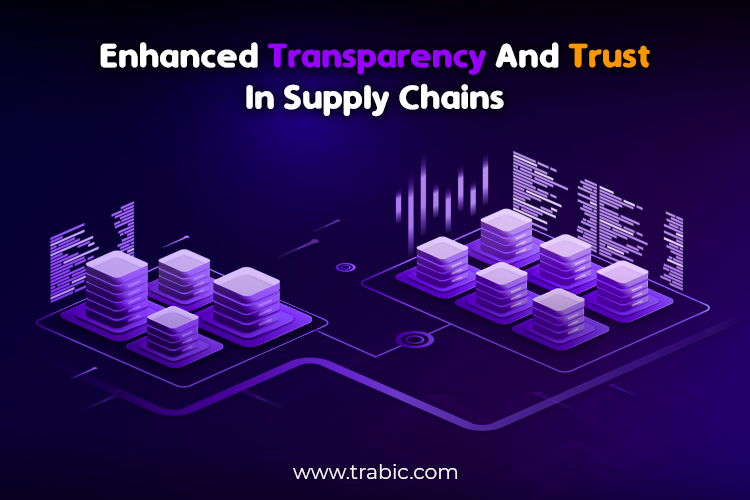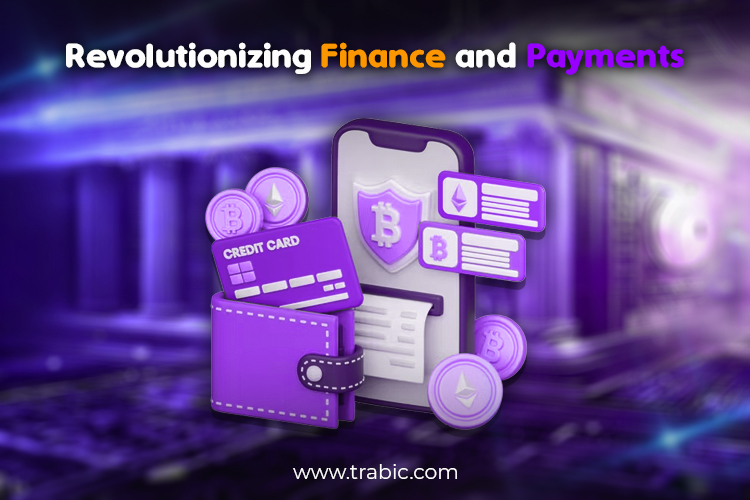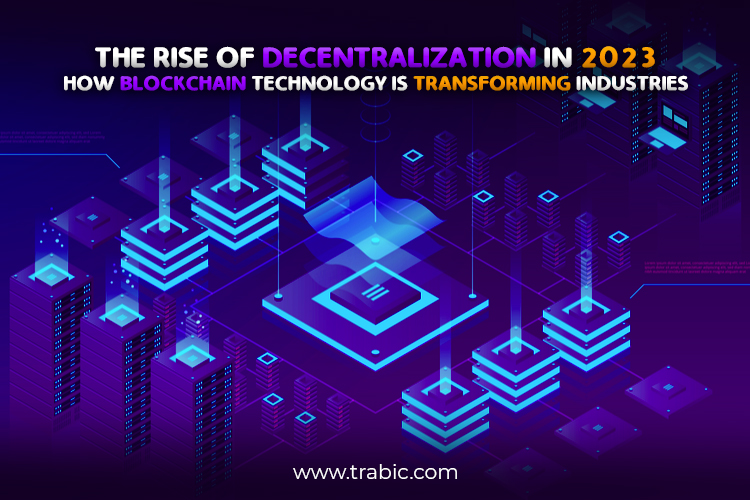In the ever-evolving landscape of technology and business, blockchain technology has emerged as a groundbreaking force that is reshaping industries across the globe. In 2023, the rise of decentralization and the transformative power of blockchain technology have reached new heights. From supply chain management to finance, digital identity to healthcare, the impact of blockchain is becoming increasingly evident.
Blockchain technology is a decentralized and transparent digital ledger that enables secure and immutable record-keeping. It eliminates the need for intermediaries, fosters trust, and enhances security, making it an ideal solution for industries plagued by inefficiencies and lack of transparency. One of the key areas where blockchain technology is driving significant change is supply chain management.
By leveraging blockchain, businesses can create transparent and tamper-proof supply chain networks, tracing the movement of goods from their origin to the end consumer. This transparency builds trust and helps eliminate counterfeit products and unethical sourcing. Blockchain revolutionizes traditional banking systems in the financial industry by providing secure and efficient alternatives. Peer-to-peer transactions through cryptocurrencies reduce reliance on intermediaries and minimize transaction costs.
Additionally, blockchain smart contracts streamline processes such as remittances, cross-border transactions, and micro-payments, further enhancing efficiency and transparency. Moreover, blockchain technology empowers individuals to control their digital identities and personal data.
With decentralized identity management systems, users can securely store and selectively share their data, reducing the risk of data breaches and enhancing privacy. In the healthcare industry, blockchain offers a secure and interoperable platform for the sharing of patient data. Electronic health records can be securely stored and accessed, enabling improved medical research, personalized treatments, and better patient outcomes.
As we embark on this journey of decentralization in 2023, businesses and individuals must understand blockchain technology’s transformative potential. By embracing this disruptive technology, we can create a future where industries are more transparent, secure, and accountable. This article will delve deeper into how blockchain technology transforms industries, paving the way for a decentralized future.
Understanding the Foundations of Blockchain Technology
Delving into technological innovation, one must recognize blockchain technology profoundly impacts our modern world. With its elaborate web of interconnected nodes, this intricate system presents a revolutionary paradigm that transcends traditional notions of trust and transparency. Blockchain epitomizes an immutable digital ledger where information is securely recorded and verified through a decentralized network. Through its ingenious design, this technological marvel has enabled many applications, ranging from cryptocurrency transactions to supply chain management, igniting a profound shift in various industries.
To truly comprehend the foundations of blockchain technology, it is imperative to unravel the intricacies of its underlying principles and explore the intricate tapestry of cryptographic puzzles and consensus algorithms that lie at its very core. Only by embarking on this intellectual journey can one grasp blockchain’s transformative power and unlock the boundless possibilities it holds for the future of our interconnected world.
Blockchain technology, often associated with cryptocurrencies like Bitcoin, has become a transformative force beyond digital currencies. At its essence, a blockchain is a decentralized and immutable digital ledger that records transactions across multiple computers or nodes. This foundational concept forms the basis for blockchain technology’s numerous applications and benefits. The decentralized nature of a blockchain is a key characteristic that sets it apart from traditional centralized systems.
A central authority or intermediary verifies and records transactions in a traditional system. However, in a blockchain, transactions are verified and added to the ledger by a distributed network of computers, also known as nodes. This decentralized approach ensures that no single entity controls the entire system, making it more resilient to failures and less susceptible to manipulation.

Immutability is another fundamental feature of blockchain technology. Once a transaction is recorded on the blockchain, altering or tampering with it becomes challenging. Each transaction is linked to the previous one, creating a chain of blocks that form the complete history of transactions. This tamper-proof nature of blockchain provides high security and trust, making it suitable for applications where data integrity is crucial.
Transparency is inherent in the design of a blockchain. All parties in a blockchain network have a permit to access the exact version of the ledger, ensuring that the information recorded is visible to everyone. This transparency fosters trust among participants and enables them to verify the authenticity and validity of transactions without relying on a central authority.
Blockchain technology streamlines processes and reduces costs by eradicating the necessity for intermediaries. In traditional systems, intermediaries such as banks, brokers, or clearinghouses play a vital role in facilitating transactions and ensuring trust.
With blockchain, these intermediaries can be bypassed, allowing for peer-to-peer transactions and direct interactions between participants. This speeds up transaction times and eliminates associated fees and complexities. In summary, blockchain technology is built on a decentralized and immutable ledger that ensures transparency and security and eliminates the need for intermediaries. This unique foundation provides the groundwork for various applications beyond cryptocurrencies.
Understanding these foundational principles is crucial for grasping the transformative potential of blockchain technology in various industries, including finance, supply chain management, healthcare, and more. By leveraging blockchain’s core principles, businesses can unlock new opportunities for innovation, efficiency, and trust in the digital age.
Enhancing Transparency And Trust in Supply Chains
In today’s interconnected and globalized world, enhancing transparency and trust in supply chains has become increasingly paramount. As businesses expand their operations across borders, consumers and stakeholders alike are demanding greater accountability and clarity in the intricate web of interconnected processes that make up the supply chain. Organizations are now employing innovative strategies and technologies to address this growing concern to promote greater visibility, traceability, and integrity throughout the supply chain ecosystem.
By embracing these advancements, companies foster an environment of trust and reliability and empower consumers to make more informed decisions, safeguard human rights, promote sustainability, and mitigate risks associated with unethical or illegal practices. In this era of heightened scrutiny, enhancing transparency and trust in supply chains is no longer an option but an imperative for organizations striving for long-term success and social responsibility.
Blockchain technology has emerged as a powerful tool for enhancing transparency and trust in supply chain management. By leveraging blockchain’s decentralized and immutable nature, companies can create transparent and tamper-proof supply chain networks that revolutionize how goods are tracked and traced. In a traditional supply chain, information about the movement of goods and transactions between various parties often needs to be more cohesive and siloed.
This lack of transparency creates inefficiencies, increases the risk of fraud, and makes it challenging to ensure ethical sourcing. However, by implementing blockchain technology, companies can overcome these challenges and build a more transparent and trustworthy supply chain ecosystem. Blockchain enables the recording of each transaction or movement of goods on a distributed ledger, attainable to all participants in the collection chain network.
This means that every party involved, from manufacturers to suppliers to distributors, can have a real-time view of the entire supply chain process. This transparency allows stakeholders to trace the origin and journey of products, providing a comprehensive and verifiable record of their movement. With this level of transparency, counterfeit products become significantly more challenging to enter the supply chain undetected.

Each product can be assigned a unique identifier or digital token recorded on the blockchain. This creates an immutable record that cannot be tampered with or duplicated, making verifying the authenticity of products more accessible. Consumers can have increased confidence in their products, knowing they are genuine and meet the desired quality standards.
Furthermore, blockchain technology enables tracking raw materials and components used in manufacturing. This helps ensure ethical sourcing and sustainability practices throughout the supply chain. By recording information about the origin of materials, their certifications, and their environmental impact, companies can provide transparency and accountability to consumers who prioritize ethical and sustainable products.
By leveraging blockchain technology to enhance transparency and trust in supply chains, companies can benefit from improved efficiency, reduced costs, and enhanced brand reputation. The ability to trace products in real time minimizes delays and errors, streamlines logistics, and optimizes inventory management.
Companies prioritizing transparency and ethical practices can also attract conscious consumers who value transparency and sustainability, increasing brand loyalty and market differentiation. Blockchain technology offers significant advantages in enhancing transparency and trust in supply chains.
By leveraging its decentralized and immutable nature, companies can create transparent and tamper-proof supply chain networks, enabling stakeholders to trace products from their origin to the end consumer. This transparency builds trust, eliminates counterfeit products, ensures ethical sourcing, and enables efficient supply chain management. Embracing blockchain technology in supply chains is vital to creating a more transparent, accountable, and sustainable global economy.
Revolutionizing Finance and Payments
Blockchain technology revolutionizes the financial industry by offering secure and efficient alternatives to traditional banking systems. Through blockchain-based cryptocurrencies, financial transactions can be conducted peer-to-peer, eliminating the need for intermediaries and reducing transaction costs. Additionally, blockchain smart contracts enable automated, secure, and transparent agreements, streamlining processes such as remittances, cross-border transactions, and micro-payments.
Traditionally, financial transactions and services have relied on centralized systems like banks to facilitate and verify transactions. This often involves complex processes, lengthy settlement times, and high fees. However, with blockchain technology, individuals and businesses can transact directly with one another, bypassing intermediaries and significantly reducing costs. Cryptocurrencies are produced on blockchain technology and enable peer-to-peer transactions. These digital currencies operate on decentralized networks, where transactions are affirmed by a distributed network of computers called nodes.
The clarity and protection supplied by blockchain technology ensure the integrity of these transactions, making them reliable alternatives to traditional banking systems. Moreover, blockchain-based smart contracts are self-executing agreements that automatically enforce the terms and conditions encoded within them. These contracts operate on blockchain networks, enabling secure and transparent interactions without intermediaries. Smart contracts can streamline various financial processes, such as remittances and cross-border transactions.

Automating these processes significantly reduces the need for manual intervention and the associated costs and delays. Micro-payments involving small-value transactions are also being revolutionized by blockchain technology. Due to high transaction fees and processing times, traditional payment systems often need help processing micro-transactions. However, blockchain-based cryptocurrencies offer a cost-effective and efficient solution for micro-payments, making them viable for use in various industries, such as content creators, gaming, and digital marketplaces.
The potential benefits of blockchain technology in finance and payments extend beyond cost reduction and efficiency. The decentralized nature of blockchain ensures that financial transactions are secure, transparent, and resistant to tampering or fraud. This increased level of security and transparency builds trust among participants and helps mitigate risks associated with traditional financial systems.
Blockchain technology transforms the financial industry by providing secure and efficient alternatives to traditional banking systems. Through peer-to-peer transactions facilitated by cryptocurrencies and smart contracts, blockchain is revolutionizing financial transactions. This technology offers cost-effective solutions, streamlines processes, and enhances security and transparency. As blockchain adoption continues to grow, it has the potential to reshape the financial landscape, empowering people and companies with more significant control over their finances.
Empowering Digital Identity and Personal Data Ownership
Data breaches and privacy concerns have become increasingly prevalent in today’s digital era. However, blockchain technology offers a promising solution for individuals to reclaim control over their digital identities and personal data. Through blockchain-based identity management systems, personal information can be securely stored and selectively shared, reducing the risk of data breaches and enhancing privacy.
Traditional identity management systems rely on centralized databases, making them vulnerable targets for hackers and unauthorized access. In contrast, blockchain technology provides a decentralized and tamper-proof platform for storing personal data. Instead of relying on a single point of failure, blockchain distributes data storage across a network of computers, known as nodes. This ensures that no single entity controls all the data, making it significantly more secure and resilient against hacking attempts.
With blockchain-based identity management, individuals can control their personal information more. They can choose which data to share, with whom, and for what purpose. By leveraging the transparency and security of blockchain, individuals can verify and authenticate their identities without relying on intermediaries. This eliminates the need for centralized databases that manage and hold vast amounts of personal information, lowering the risk of data infringements and unauthorized access. Selective data sharing is a fundamental aspect of blockchain-based identity management systems.
Users can share specific data attributes with trusted entities or service providers without revealing their profiles. This granular control over data sharing enhances privacy and minimizes the exposure of personal information. Additionally, since blockchain transactions are recorded and traceable, users can have a transparent view of who accessed their data and for what purpose, fostering trust and accountability.
Furthermore, blockchain-based digital identities can streamline various processes that require identity verification. For example, in the financial industry, individuals can use their blockchain-based digital identities to access banking services, open accounts, or apply for loans without extensive paperwork or multiple verification steps. This simplifies and accelerates processes while maintaining data security. Blockchain technology empowers individuals to take control of their digital identities and personal data.
Blockchain-based identity management systems offer enhanced security and privacy by leveraging decentralized and tamper-proof storage. Selective data sharing allows individuals to share specific attributes without compromising their profile. As blockchain-based digital identities evolve, individuals will have greater control over their personal information and be better equipped to navigate the digital landscape confidently.
Disrupting the Healthcare Industry
The healthcare industry is mature for trouble, and blockchain technology holds the potential to revolutionize the way patient data is stored, shared, and utilized. With its secure and decentralized nature, blockchain can transform the healthcare landscape by enabling secure and interoperable sharing of patient data, leading to improved medical research, personalized treatments, and enhanced patient outcomes.
Traditionally, patient data is scattered across various healthcare providers, making it difficult to access and share critical information. This fragmented system can result in inefficiencies, delays, and potential patient safety risks. However, with blockchain technology, electronic health records (EHRs) can be securely stored and accessed on a decentralized network. This ensures that patient data remains private and tamper-proof while accessible to authorized parties when needed.
By leveraging blockchain technology in healthcare, interoperability between different healthcare providers and systems can be achieved. Patient records, test results, diagnoses, and treatment plans can be securely stored on the blockchain, allowing healthcare experts to view a patient’s medical history thoroughly. This interoperability improves care coordination, reduces medical errors, and enhances patient safety.
Blockchain technology’s secure and transparent nature also opens up new possibilities for medical research. Researchers can access anonymized and aggregated patient data stored on the blockchain, enabling large-scale analysis and insights. This has the potential to accelerate medical breakthroughs, foster innovation, and improve healthcare outcomes for patients worldwide. Additionally, blockchain can enable the secure sharing of clinical trial data, enhancing transparency and trust in the research process.
Personalized medicine is another area where blockchain can have a profound impact. Access to a patient’s comprehensive medical history on the blockchain allows healthcare providers to develop tailored treatment plans based on individual characteristics, genetic profiles, and previous therapy responses. This personalized approach can guide to more effective treatments, reduced adverse reactions, and improved patient experiences. Moreover, blockchain technology can address data privacy concerns in healthcare.
With robust encryption and consent mechanisms, patients can have greater control over their data and determine who can access it. This empowers individuals to participate in healthcare decisions and protect sensitive information actively.
It can disrupt this industry by enabling secure and interoperable sharing of patient data. This decentralized approach to healthcare data storage can improve care coordination, enhance medical research, enable personalized treatments, and eventually guide more reasonable patient outcomes. As blockchain adoption in healthcare continues to grow, the industry is poised for a transformation that will revolutionize how healthcare is delivered and experienced.
